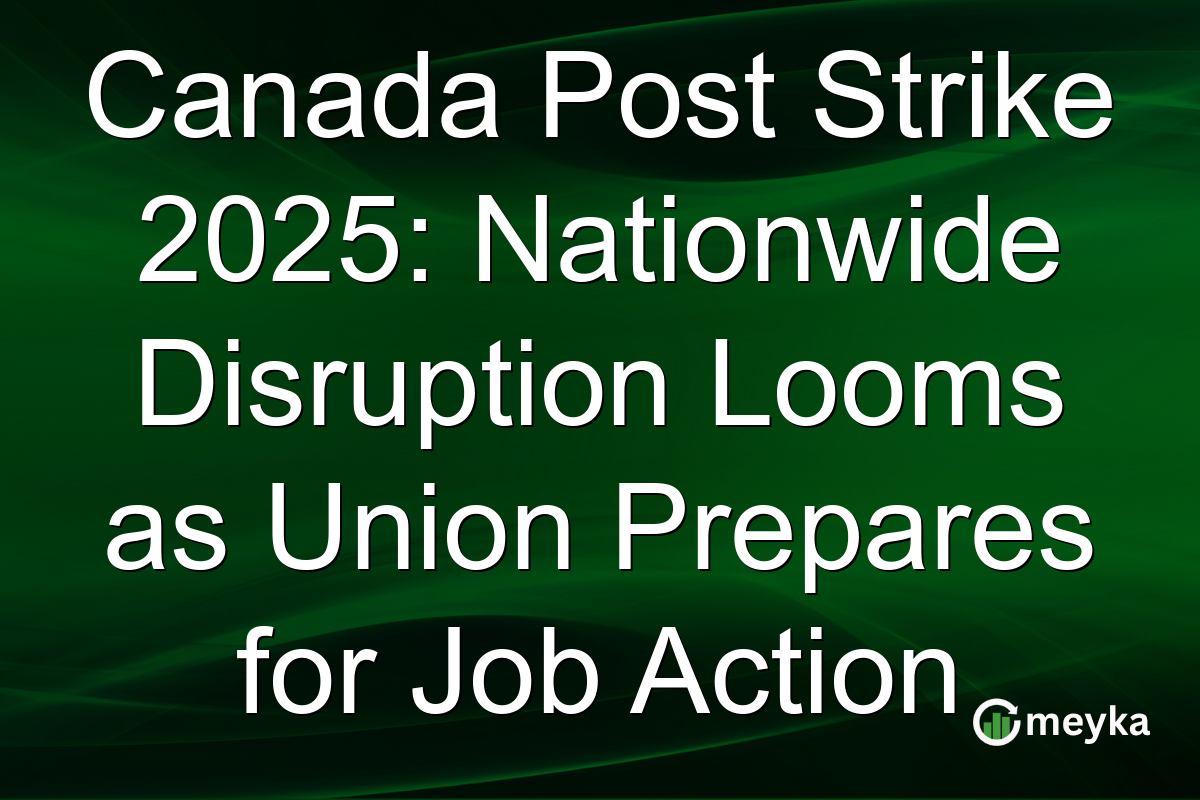Canada Post Strike 2025: Nationwide Disruption Looms as Union Prepares for Job Action
As of today, the Canadian Union of Postal Workers (CUPW) is gearing up for potential nationwide job action amid ongoing disputes in the Canada Post strike 2025. With union negotiations at a standstill, the likelihood of postal delivery disruptions across the country is growing. This escalation could severely impact both businesses and consumers, adding to existing inflationary pressures and unresolved workplace issues.
Unpacking the Canada Post Strike 2025
The “Canada Post strike 2025” comes after months of stalled negotiations between Canada Post and the Canadian Union of Postal Workers. The CUPW has highlighted workplace conditions and wage concerns as primary sticking points in discussions. According to a CBC News report, union leaders are preparing for job action if their demands aren’t met soon. This potential strike is set against a backdrop of national inflation and economic uncertainty. The rising cost of living has amplified the union’s call for better wages and conditions, making these negotiations particularly tense. For the millions of Canadians who rely on postal services, the threat of disrupted deliveries looms large.
Impact on Postal Delivery and Businesses
A nationwide strike would halt regular mail and package deliveries, affecting businesses and consumers alike. According to Yahoo Finance, daily operations could see significant delays, leading to a backlog of undelivered mail. Businesses that depend on timely deliveries for shipping products could face disruptions in supply chains. This isn’t just a hindrance to local businesses; international partners relying on Canadian postal services might also experience delays, affecting trade and commerce on a larger scale. Consumers are likely to experience delays in receiving important documents or packages. With other delivery services potentially overwhelmed by increased demand, alternative options may become limited or costly.
The Broader Economic Context: Inflation and Workforce Demands
The “Canada Post strike 2025” is not occurring in isolation. It reflects broader economic and labor trends. Inflation rates continue to climb, influencing both the cost of living and wage demands. As noted by BNN Bloomberg, the rising inflation rate puts additional pressure on both the union and management to finalize terms that reflect current economic conditions. Workforce issues like safety, workload, and job security are at the forefront of the union’s demands. The situation highlights a growing trend in labor relations where economic factors and workforce welfare are becoming more critical in negotiations. Companies across Canada are watching these developments closely, as they may set precedents for other sectors facing similar challenges.
Future Outlook: Navigating Negotiations and Resolve
Looking ahead, the outcome of the Canada Post strike 2025 negotiations could reshape labor relations within the postal service and beyond. Successful talks might lead to improved conditions for postal workers and serve as an example for other industries facing similar demands. However, if negotiations remain stalled and job action proceeds, there could be substantial disruptions in postal services nationwide. This outcome might force businesses and consumers to seek alternative delivery solutions, potentially increasing costs in an already strained economy. For investors and market analysts, observing these developments will be crucial. Platforms like Meyka can offer valuable insights into how these labor disputes may affect market conditions, providing timely analysis for informed decision-making.
Final Thoughts
The looming Canada Post strike 2025 underscores the critical importance of effective union negotiations amid economic challenges. As both sides navigate these complex discussions, the future of postal services hangs in balance, affecting millions of Canadians. Staying informed through resources like Meyka can provide investors with the insights needed to understand these evolving dynamics and their potential impact on the market.
FAQs
The primary reasons are disputes over workplace conditions, wages, and unresolved economic factors like inflation, leading to a call for better terms by the Canadian Union of Postal Workers.
A strike would lead to delays in mail and package deliveries, disrupting supply chains and increasing costs for businesses that rely heavily on timely deliveries.
If negotiations fail and the strike proceeds, postal services nationwide would experience significant disruptions, affecting both consumers and businesses.
Disclaimer:
This is for information only, not financial advice. Always do your research.






